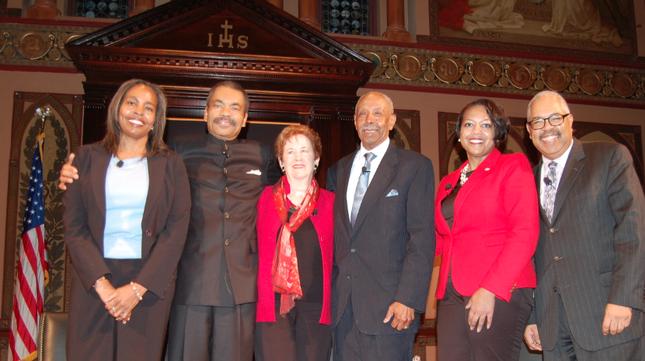Georgetown’s Black History Lives Anew at Gaston Hall
By • March 16, 2016 0 2224

The evening began with winds, thunder and flooding, as participants made their way to Georgetown University’s Gaston Hall for a discussion of the town’s black past and its people as well as recognition of the 25th anniversary of the ground-breaking “Black Georgetown Remembered,” published by the university in 1991.
Spurred by the university’s bicentennial celebrations in 1989, the book tells the story of black Georgetown from the perspective of those living at the time and their memories of a town that included many more black people. “Black Georgetown Remembered” was a book that put black Georgetowners back on the map and in the mind of present residents.
Moderated by Georgetown professor Maurice Jackson, the panel on stage included the book’s co-authors Valerie Babb and Kathleen Lesko joined by black Georgetowners Vernon Ricks, Monica Roache and Neville Waters.
“Once a Georgetowner, always a Georgetowner” was a phrase heard in a film shown to the audience and spoken by a panelist or two. They meant the black town’s past and present. Eva Calloway was shown in the film, saying that her part of Georgetown “had that love” of family, neighbors and business owners.
At the beginning of the discussion, Babb brought up the memory of Raymond “Pebbles” Medley, who lived at the Jesuit community from an early age and was well known around campus to students and teachers alike. She gave him for credit for sparking an interest in Georgetown’s black history. Lesko noted that the book was “a transformative project.”
Babb also asked what were the cost of changes to a community these days, especially that Georgetown seems more and more exclusive.
The older Ricks, who was born across from Rose Park, recalled a happy childhood where everything was available in town as well as the ice man, the coal man, the watermelon man — and pulled no punches, calling the exodus of blacks from Georgetown “deportation or gentrification.”
Roache, a fifth-generation Georgetowner, spoke next of how much Georgetown has changed in just the last 25 years. As the newest advisory, neighborhood commissioner, she asked, “What can I do to continue the legacy?” Roache ask those black Georgetowners, past or present, in the audience to stand and take a bow.
Waters, who has lived on P Street and now lives in the same place where his father was born and died, recalled the service workers, such as the knife sharper, who came every Saturday, dinging his bell for the. One day, he did not hear the bell and knew the man had died or gone away. He said, “We were proud to be Georgetowners,” adding that he went to Georgetown University, too, and was “proud to be a Hoya.”
After the discussion, audience inquiries ranged from Jackie Kennedy bringing Caroline to Rose Park and to how housing covenants froze blacks out of Georgetown and bigotry destroyed a neighborhood.
After the greetings at the reception afterwards, as participants departed, the sky in a manner of a few hours was calm, clear, blue and illuminated by a near-full moon — as if a sign from long-past ancestors.

